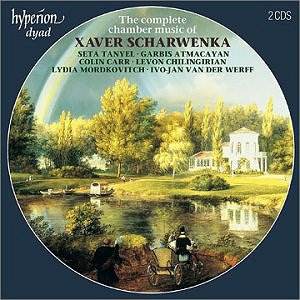The delicate and debonair romantic Piano Trio and Violin
Sonata have the manners of early Beethoven (Septet, Second Piano Concerto,
Second Symphony) and of Mendelssohn - not the last time I shall mention
that composer. Scharwenka works happily within this idiom but displays
a well turned skill as a fresh tune-smith who speaks of grace, playfulness
and beauty. The First Trio has a gem of an andantino. Lydia Mordkovitch
(on holiday from Chandos) with her plungingly eloquent febrile tone
is a superb foil to Seta Tanyel's lively imagination and Florestan romance.
Mordkovitch's delicate moonlight skills can also be heard in the Op.
70 Serenade. You should not expect scorching passion in the two early
works (Opp. 1 and 2); Scharwenka has a much lighter touch though one
that is far from inconsequential.
Scharwenka's Cello Sonata is a deeper work that probes
more demandingly and gazes at times into the early style of Rachmaninov.
Colin Carr's singing resinous tone is memorable. For all that Scharwenka
was a keyboard lion among Europe's pianistic pride he wrote generously
and unselfishly for stringed instruments.
The second disc includes two substantial and ambitious
works - a piano quartet and a piano trio - each approaching forty minutes
duration. The Piano Quartet has a magically trilling first movement,
flowingly Mendelssohnian and as striking as the andantino of
the First Piano Trio. A hesitantly thoughtful adagio is followed
by an allegro vivace which frames a delightfully rocking 'dream
dance' with pushy and alert scherzo episodes. I was not quite so sure
about the busy turbulent romance of the finale. There is quite a bit
of Schumann in the piano writing here.
The Second Piano Trio is deeply immersed in the nineteenth
century romantic melos and its roots are struck deep into Schumann territory.
While there are no signs of originality in the language the flow and
concentration is irresistible and well sustained even across such a
substantial structure. While the second movement has the salon quality
of a 'maiden's prayer' and the scherzo third infuses Mendelssohnian
fleet-foot pacing into another sweet-toned lullaby picked out with the
pizzicato equivalent of bone china.
Seta Tanyel is the strong and sensitive constant throughout
all six pieces. There is little difference between the two recording
venues. The second disc is distinguished by intakes of breath (not many)
that I do not recall at all from the first disc. I did not find that
a problem.
The notes and performing materials are all courtesy
of Martin Eastick. It is too much to hope that Scharwenka's opera Mataswintha
would be recorded but given Hyperion's superb disc of the two Bortkiewicz
symphonies I wonder if they are thinking of coupling the Scharwenka
symphony perhaps with one of Benjamin Godard's exotics. Seta Tanyel
recorded the Scharwenka Second and Third Piano Concertos for Collins.
Is there any chance of Hyperion acquiring the rights and reissuing this
as part of the ever-expanding Romantic Piano Concerto series? While
we are on the subject of neglected Slav piano concertos I rather hope
that Hyperion will see the commercial symmetry of recording the second
and third Bortkiewicz piano concertos as a follow-on to their recording
of the two symphonies and the First Piano Concerto. Bortkiewicz was
much more than the inconsequentiual note-spinner reputation that has
been pinned to him.
Back to Scharwenka. This is all highly attractive romantic
music caught in the web of lay-lines between Schumann and early Fauré.
Prettiness and empty display are absent and Scharwenka shows himself
to be a serious musician well able to sustain an equable instrumental
balance without undue prominence to the heroic piano.
Rob Barnett
